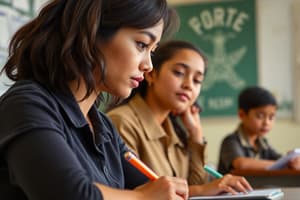Podcast
Questions and Answers
Which theory emphasizes that education contributes to social stability by promoting shared values?
Which theory emphasizes that education contributes to social stability by promoting shared values?
- Functionalism (correct)
- Critical Theory
- Conflict Theory
- Social Constructionism
What primary factor contributed to unequal access to higher education during apartheid?
What primary factor contributed to unequal access to higher education during apartheid?
- Lack of interest from students
- Policies preventing black students from attending (correct)
- Abundance of universities available
- High tuition fees for all students
What is the main role of NSFAS in the South African higher education system?
What is the main role of NSFAS in the South African higher education system?
- To provide financial support for black students (correct)
- To regulate university admissions
- To manage university infrastructure
- To develop new university curricula
In the context of the sociology of education, what function does education primarily serve?
In the context of the sociology of education, what function does education primarily serve?
Which demographic shift has been observed in South Africa regarding higher education access?
Which demographic shift has been observed in South Africa regarding higher education access?
What is an outcome of the requirement that all South African universities must comply with measures for redressing past inequalities?
What is an outcome of the requirement that all South African universities must comply with measures for redressing past inequalities?
Which theoretical perspective views inequality in educational access as a result of competition between social groups?
Which theoretical perspective views inequality in educational access as a result of competition between social groups?
What is the significance of having the National Senior Certificate (Bachelors Pass) for university admission in South Africa?
What is the significance of having the National Senior Certificate (Bachelors Pass) for university admission in South Africa?
What is one of the main functions of education in society according to the sociology of education?
What is one of the main functions of education in society according to the sociology of education?
How do proponents of the conflict perspective view education?
How do proponents of the conflict perspective view education?
Which of the following is an argument commonly associated with the functionalist perspective on education?
Which of the following is an argument commonly associated with the functionalist perspective on education?
Which term describes the unwritten norms and values transmitted through education?
Which term describes the unwritten norms and values transmitted through education?
What aspect of the education system does the Constitution of South Africa emphasize?
What aspect of the education system does the Constitution of South Africa emphasize?
What is a significant challenge facing the South African education system?
What is a significant challenge facing the South African education system?
Which of the following best defines the role of informal education?
Which of the following best defines the role of informal education?
How do rich (private) schools generally differ from poor (public) schools in terms of educational outcomes?
How do rich (private) schools generally differ from poor (public) schools in terms of educational outcomes?
What is one key function of education as identified by functionalists?
What is one key function of education as identified by functionalists?
Which perspective emphasizes the role of education in creating and perpetuating societal inequalities?
Which perspective emphasizes the role of education in creating and perpetuating societal inequalities?
According to functionalists, what societal outcome is most directly linked to education?
According to functionalists, what societal outcome is most directly linked to education?
Which question would a conflict theorist most likely ask about education?
Which question would a conflict theorist most likely ask about education?
What is one critique of the role of schools according to the conflict theory perspective?
What is one critique of the role of schools according to the conflict theory perspective?
Which of the following is NOT a key function of education described in the functionalist perspective?
Which of the following is NOT a key function of education described in the functionalist perspective?
What impact does funding have on educational outcomes, according to conflict theory?
What impact does funding have on educational outcomes, according to conflict theory?
Emile Durkheim emphasized the role of education in socializing children to understand which of the following?
Emile Durkheim emphasized the role of education in socializing children to understand which of the following?
Flashcards are hidden until you start studying
Study Notes
Formal and Informal Education
- Formal education is structured learning that takes place in a designated setting like a school, with a planned curriculum, qualified instructors, and assessments.
- Informal education encompasses learning outside of formal settings, including self-learning, experiences, interactions, and everyday life.
Social Functions of Education
- Transmission of culture: Education plays a crucial role in transmitting societal norms, values, beliefs, and acceptable behaviors to younger generations.
- Skills development: It teaches individuals the necessary skills for a productive and fulfilling life, both within and outside the workplace.
- Social integration: Education can promote social cohesion by bringing together individuals from diverse backgrounds, fostering shared values, and creating a sense of belonging.
- Screening and Selection: Education serves as a mechanism for identifying and selecting individuals with the necessary skills and qualifications for specific roles and careers.
Conflict Theory and Education
- The conflict theory perspective highlights how education can perpetuate social inequalities and reproduce existing power structures.
- It emphasizes the role of social class, race, and gender in shaping educational experiences and outcomes.
- The theory challenges the idea of a meritocratic education system by emphasizing the systemic biases built into school systems, such as unequal access to resources and different quality of education based on socioeconomic background.
Challenges in South African Education System
- The South African education system faces ongoing challenges rooted in its history of apartheid and segregation, impacting access and quality of education across different social groups.
- The system struggles with issues like inequality in funding and resources, disparities in teacher quality, and high dropout rates, particularly affecting marginalized communities.
- Ongoing efforts focus on addressing these challenges by ensuring greater access to quality education, improving teacher training, and promoting equitable learning opportunities for all.
Comparing Rich and Poor Schools
- Public schools, often serving lower-income communities, face numerous challenges, including limited access to resources, overcrowded classrooms, and lack of qualified teachers.
- Private schools, typically catering to wealthier families, often offer superior facilities, smaller class sizes, and a more rigorous academic environment, leading to better educational outcomes for their students.
- These disparities reflect the broader economic and social inequalities in society and raise concerns about the impact of socioeconomic status on educational opportunities and success.
Higher Education in South Africa
- South Africa has a well-established higher education system with numerous universities, but inequalities persist in access to higher education institutions.
- The system faces challenges in addressing historical inequalities, including the lack of access for black students during apartheid and ongoing disparities in funding and resources.
- The National Student Financial Aid Scheme (NSFAS) is a critical program that provides financial support to students from disadvantaged backgrounds, aiding in their goal of pursuing higher education.
Studying That Suits You
Use AI to generate personalized quizzes and flashcards to suit your learning preferences.




